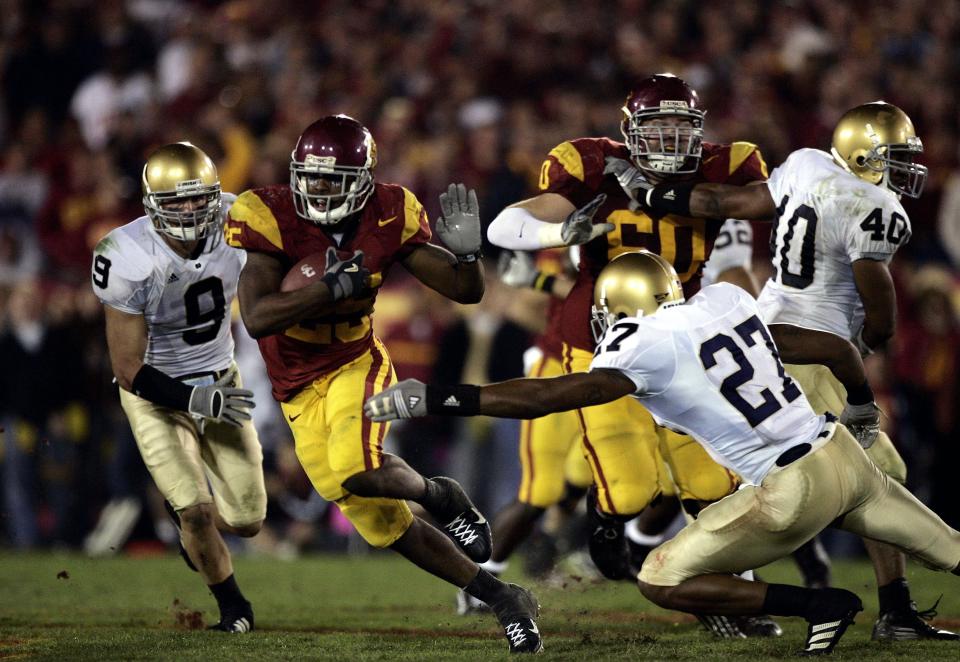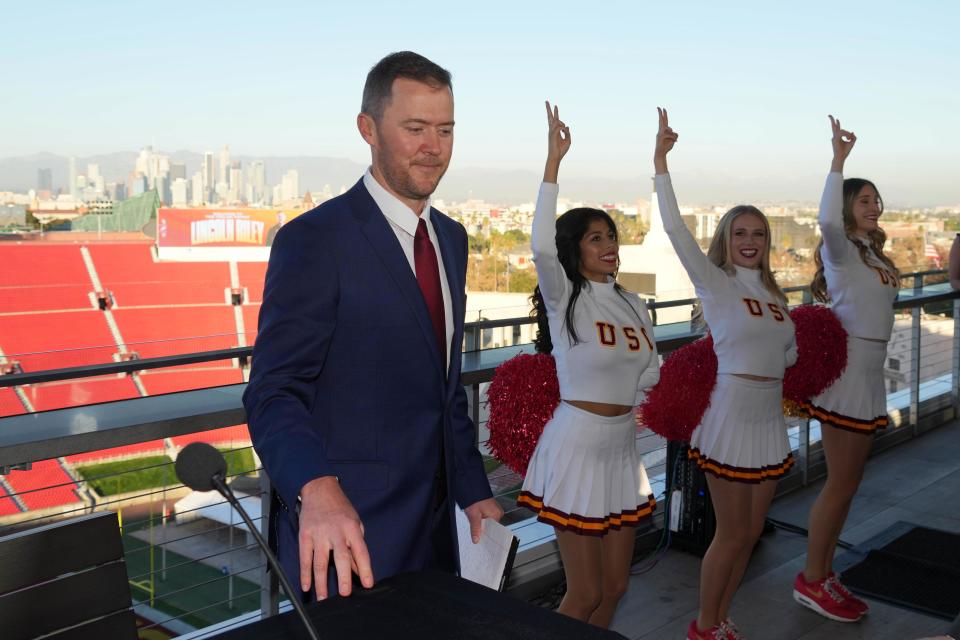Notre Dame-USC: Burning questions as Irish look to end Trojans CFP dreams

Notre Dame-USC might not feature two teams playing for a potential College Football Playoff spot but one is and the other has looked the part of a top-10 team nationally over the last month. How does Notre Dame go into Los Angeles and play spoiler to the Trojans, who are likely two wins away from their first College Football Playoff appearance?
To find out more about the bigness of this game and where Notre Dame can possibly look to exploit weaknesses in USC, we spoke to Matt Zemek, the managing editor of Trojans Wire. Here is how Matt answered our questions about Saturday’s showdown.
This is the biggest ND-USC game since when?

(Photo by Donald Miralle/Getty Images)
Trojans Wire: 2006. Notre Dame got shredded by LSU in the Sugar Bowl a month later, but that was still a very important game going in. It felt bigger because of 2005, whereas the 2002 game — which is an interesting game to compare to 2022 (first-year Notre Dame head coach going up against a USC team with a Heisman-contending quarterback) — didn’t feel as large because Ty Willingham’s team didn’t have as high of a ceiling as the 2006 Irish did. Charlie Weis felt like a coach in late 2006 who could still do special things at Notre Dame. 2002 marked the end of Notre Dame having real hope after Willingham’s otherwise successful first season on the job.
Besides the transfer portal, what has Lincoln Riley done to turn USC around so quickly?

Kirby Lee-USA TODAY Sports
his might seem cliche, and it might elicit some groans and eye-rolls, but it’s true: culture.
Trojans Wire: Lincoln Riley really did change the culture. Maybe that’s not a total credit to him, because the culture was extremely bad under Clay Helton and nearly anyone could have improved the culture in one year. However, Riley has improved the culture on a scale which is hard to measure even now. That’s how vast the transformation has been for USC.
This team used to be soft. It is now very tough, not so much physically, but as a measure of resilience. The defense got shredded by UCLA but made a big play late to win it. That’s the cultural change. Teams with great talent can utterly fail to rise to moments. This is a flawed team with minimal defensive talent which has risen to meet the moment several times this season. Look at the Oregon State game in Week 4 (Sept. 24). The offense played a bad game and scored only 17. No one thought USC could win a 17-14 game this season. The Trojans would have gotten crushed if they scored only 17. Yet, the defense played amazingly well on the one night this season when the offense was legitimately bad.
That’s culture. Guys stepping up and supporting teammates when teammates don’t play well. Most of the time, the offense carries the defense, but the D has bailed out the O when needed. That’s culture. Groan if you’d like, but the way a team carries itself is a reflection of the guy at the top and the way an operation is conducted. That has meant everything to USC this year.
What is the weakest link on USC's powerful offense?
Trojans Wire: The weakest link is simply offensive line depth. The first-stringers were expected to be great when healthy, and they have. Injuries really began to hit in the second half of the season. Andrew Vorhees is the O-line’s best NFL draft prospect. Bobby Haskins, the transfer from Virginia, has been banged up. Mason Murphy is a backup. He had to start a game against Arizona on Oct. 29, and he has played both left and right tackle. He did okay, which — given that he is a backup — was huge for this unit. Generally, though, the line is a lot better when the five starters are in. Crucially, Vorhees and Haskins were close to full strength against UCLA, and you saw how well USC’s offense functioned when the line was generally healthy and intact. If one of those guys goes down early against Notre Dame, the Irish have to feel they can do damage.
How big is it for USC to get Jordan Addison back for this stretch run?
Trojans Wire: He did not play against Arizona or Cal (Oct. 29, Nov. 5), and he made a brief appearance against Colorado just to get the blood flowing in live action. He certainly had his full game back against UCLA: 11 catches, 178 yards, and a game-changing effect on the UCLA secondary which opened up opportunities for other receivers such as Kyle Ford.
Addison essentially gave USC’s offense the elite playmaking and product the Trojans lost with the Travis Dye injury. It showed that as long as one of the two is healthy, this offense can still cook.
Notably, though, Mario Williams was not able to make any real impact against UCLA. He, like Eric Gentry on the defensive side, was expected to play, briefly participated, but really couldn’t do much. It will be worth monitoring their health this week.
What do you have complete confidence in USC being able to do on offense vs. Notre Dame?
Trojans Wire: Throw short-to-intermediate passes. I can’t assume that USC will establish the deep ball, nor can I assume that USC will run the ball really well against Notre Dame’s offensive front, but even if the Irish have a few cover corners who are performing well (and they do), USC has so much depth at receiver that Lincoln Riley is going to be able to force Notre Dame’s linebackers to cover the whole field, and that will be a challenge for the Irish.
The USC O-line will provide good pass protection for Caleb Williams, but if the Irish get more pressure, Riley can to go a screen game or a short passing game which will neutralize the pass rush.
How do you limit Tuli Tuipuloto's impact on defense?
Trojans Wire: They will double-team him. They certainly devote a lot of attention to him, and why wouldn’t they? Solomon Byrd and Tyrone Taleni make some important plays up front (as Taleni did when he forced a UCLA fumble on Saturday), but no one is even close to Tuli in terms of overall impact along the USC defensive front. Nick Figueroa helps, but it’s really Tuli and then everyone else, which is why opponents are correct to force someone other than him to make plays for the Trojans.
Where is USC vulnerable on defense?
Trojans Wire: In the first half of the season, when linebacker Eric Gentry was healthy, the USC secondary played well and did not get beaten over the top. USC did not allow home-run pass plays through the first six games (Oct. 8 against Washington State). In the second half of the season, the USC secondary has leaked oil and given up a ton of long pass plays. Gentry has long arms which deflect passes, and long strides which enable him to cover ground very effectively. He took a big burden off the backs of the secondary. He really was the nerve center of the defense. Without him, the performance of the secondary has plummeted.
The larger point to make, though, is that while the defensive line is comparatively better than the linebackers or secondary, it’s not an outright strength; it’s merely a less awful unit. All parts of this defense are attackable. Alex Grinch tries to minimize his weaknesses by taking away the run or pass. Against UCLA, he took away the run, and Zach Charbonnet did not get 100 yards. UCLA threw the ball really well. Expect Grinch to try to take away the run here, but Notre Dame’s offensive line might mash USC anyway and put the Trojans in a very difficult spot.
USC has been unreal in creating turnovers this season. Is that something they can actually rely on?
Trojans Wire: It’s not possible, but USC has certainly come up with clutch takeaways this year, the Oregon State game being the other really good example in addition to UCLA this past weekend. The other part of the turnover story at USC which is worth noting: USC has turned the ball over just four times all season, with one lost fumble and three Caleb Williams interceptions. Not giving up the rock matters so much. USC’s one turnover against UCLA was cashed into seven points USC not giving up free points or possessions (on a large scale) has been necessary in 2022, given the limitations of the defense. USC could not have won two games in which it gave up 37 or more points (Arizona, then UCLA) if it hadn’t won the turnover battle in those games.
Brian Mason has Notre Dame's special teams ticking. Is USC vulnerable here?

Matt Cashore-USA TODAY Sports
Trojans Wire: This is what scares the daylights out of me from a USC perspective. USC has no special teams coordinator. The Trojans’ special teams were atrocious against UCLA — two missed field goals under 35 yards, two bad pooch kickoffs which gave UCLA great field position, no big returns — and they have been below average all year. This is by far the biggest mismatch in the game for Notre Dame. USC needs to think hard about punting if it faces a 4th and 2 near midfield in the first half of the game. Those should not be automatic punting situations for the Trojans.
What are the biggest adjustments USC has had to make this year?
Trojans Wire: The successful adjustment has been offensive line coach Josh Henson mixing and matching to get backups in position to replace injured starters and not get overwhelmed. Andrew Vorhees, Bobby Haskins, Justin Dedich and Courtland Ford have all missed games this season. I mentioned Mason Murphy needing to fill in as a backup. Gino Quinones has had to fill in at times. Giving guys enough important reps while also resting them and making sure they are healthy for future games has been a tricky balance, but Henson has calibrated his decisions extremely well.
The unsuccessful adjustment has been to find ways to keep things simple and successful for the secondary and linebackers after the Eric Gentry injury on Oct. 15. With Gentry, this defense is cohesive and competent. Without him, it’s a much more frail group.
Notre Dame pulls the upset if:
Trojans Wire: They hit two pass plays of 35 or more yards, win third downs by a considerable margin, and block a punt for a touchdown.
USC wins this game if:
Trojans Wire: They don’t have a kick blocked or returned for big yardage, hold ND under 125 rushing yards, and get TDs in the red zone.
Which team does the overall coaching favor?
Trojans Wire: Not to cop out here, but it’s a tie. Riley over Marcus Freeman gives USC a checkmark, but Brian Mason over USC’s lack of a special teams coordinator is a massive mismatch in favor of the Irish. I think Alex Grinch is a better coordinator than Tommy Rees. USC has a moderate advantage at head coach, a tiny advantage at the opposite coordinator spot, and a titanic disadvantage on special teams. Using math, “moderate + slight = titanic,” so I’m calling it a wash.

